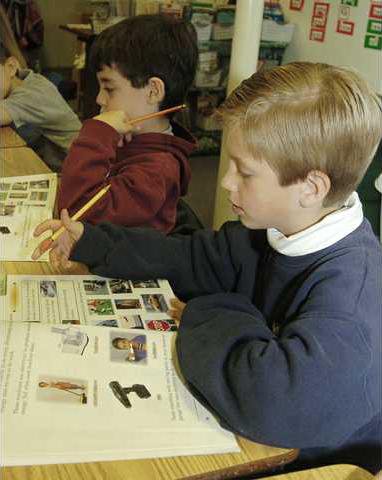0222VouchersAUD
Hear Hall County Superintendent Will Schofield’s take on the proposed school vouchers bill.Private school vouchers for public school students — it’s controversial legislation that many public educators hope will just go away.
But the General Assembly is again grappling with the issues of Senate Bill 90, proposed earlier this month by Savannah’s Republican Sen. Eric Johnson, who has pitched various forms of it in past sessions.
Johnson said that, if passed, the bill could provide students who have been enrolled in Georgia public schools at least one year with a $3,000 to $5,000 state-funded voucher to attend private schools as soon as August.
The bill has public educators up in arms — yet again.
“It’s a terrible time,” Gainesville schools Superintendent Merrianne Dyer said. “Public schools are fighting to keep every dollar we can in order to provide services for our children. ... I don’t think that it will (help children) if resources are taken out of public schools without addressing the root problem at the school from which they came.”
The voucher program is one that Johnson, a 2010 candidate for lieutenant governor, has been pushing since he first was elected to the legislature in 1993. Johnson said he aims to improve education in Georgia by giving parents more choices.
The public school graduate said more choices would create competition among public schools, as well as between the private and public education realms, and would in turn drive better “customer service” in public schools.
The bill also would allow parents to place their children in a school system outside their home district. For example, he said the bill would allow Hall County students to enroll in Forsyth County schools if the Forsyth system were receptive.
“This has been a passion of mine since day one of my political career,” Johnson said. “... One of the frustrations that parents have with public school is that nobody listens, nobody talks to them. They can’t get what they want. And they will get more attention and more response if they have the ability to move their child to another school.”
Other candidates seeking office in 2010 are squaring off on the issue.
David Poythress, a 2010 Democratic gubernatorial candidate, calls the voucher bill a “distraction” and “nonsense.”
“I think the proposal that has been made to the General Assembly is a real threat to education,” said Poythress, a former state labor commissioner and former adjutant general. “It amounts to a declaration of defeat that the state of Georgia is not able to craft a quality education. ... The right answer is to invest in the public school system.”
Johnson said some parents may want to use a voucher to provide a different type of education for their child.
“They may decide they want a Christian or Jewish or Hebrew education, and there’s no God in the public classroom,” he said. “It may be they want a school that has 10 kids in the classroom instead of 30 kids in the classroom.”
The deal, in dollars and sense
The voucher plan would allow parents to receive per-student allotments from the state to supplement private school tuition, which averages about $7,000 in Georgia.
State allotments, which Johnson said range from about $3,000 to $5,000 depending on a child’s age and needs, are doled out to school systems and coupled with local revenues to provide the majority of funding for local systems.
Johnson said systems would retain the local portion of tax revenues for any student who opts for private school vouchers.
Public school superintendents and the Professional Association of Georgia Educators, the state’s largest group of teachers, loathe the idea.
Public educators fear the rerouting of an unpredictable amount of state funds to private schools this August would wreak havoc on budgets they must devise this spring. Superintendents already are bracing for the loss of funding, and anticipate state budget cuts of at least 3 percent next year.
Hall County schools Superintendent Will Schofield said if 5 percent of the system’s students left next school year, as Johnson estimates, they would take with them about $6 million in state funds.
In Gainesville schools, Dyer said the voucher plan would redirect about $1.2 million in state funds to private schools if 5 percent of the system’s population used a voucher.
Schofield said Hall County wouldn’t be helped much by keeping its local tax revenue while state funds are re-routed into vouchers.
“We don’t know who is going to show up on our rolls until school starts,” Schofield said. “Which means we’ve got to hire teachers, and from a long-range standpoint, we have to build schools, build classroom space ... we have to hire administrators, we have to procure textbooks, we have to plan bus routes. And finding out Sept. 1 that 200 students, eight from each of our schools, are no longer with us doesn’t give us any opportunity to lower our costs at all.
“None of the students will be clustered enough that we can eliminate teaching positions, that we can no longer run a bus route, that we can send textbooks back to the publisher ... So the argument that ‘Gosh, that’s that many fewer students so the system can lower its expenses,’ it just doesn’t wash.”
But supporters of the bill say the voucher plan will leave more local revenues in public schools to spend on fewer students. According to an analysis by the Georgia Public Policy Foundation, which describes itself as a nonpartisan think tank, the Hall County system would have had about $700 more per student to spend if 20 percent of the system used a private voucher in the 2006-2007 school year.
And the winner is...
Some private school principals are pleased to hear about the proposed vouchers. North Georgia Christian School President Scott Smith said the school is down 30 students this year. He attributes the decline to an economic climate that has left some parents unable to afford tuition that costs up to $7,510.
Smith said he hopes the bill could give the school’s dwindling enrollment numbers a boost. Plans are to open an expanded new campus this fall.
Some local public school parents said they might give vouchers a shot if private schools could provide a better education for a child who needs more one-on-one attention. Others said they’re happy with local schools and wouldn’t dream of taking their children out of Gainesville or Hall schools.
“It comes down to two questions,” Johnson said of his bill. “The first one is, who is better capable of making the decision of about where their child should be educated using existing government tax dollars to do it: the government or the parent? And virtually everybody would say the parent except for stubborn or arrogant liberals. ...
“The second question is to the superintendent: If you’re doing such a good job, what are you so worried about? Then no one is going to take the voucher.”
“I don’t think we’ll lose them,” Dyer said of Gainesville students.
Despite resistance from public educators and state school Superintendent Kathy Cox, some legislators, like Rep. James Mills, R-Gainesville, support the voucher bill and the competition between schools it aims to create.
Two years ago, Johnson succeeded in passing a similar bill that provided private school vouchers to public school students with special needs.
Only one-half of 1 percent of the state’s nearly 180,000 special-education students took advantage of the bill in the 2007-2008 school year, according to Dana Tofig, spokesman for the state Department of Education. Tofig said 675 of those 825 special needs students stuck with their private school this school year.
Schofield said the system has had six special-needs students take advantage of the vouchers, while Dyer said only one Gainesville special-needs student used the private school voucher so far. She said that student returned to the Gainesville school system this year.
More than money at stake
Public educators’ qualms with the bill don’t end with the bottom line.
Some worry the bill would foster a “two-tiered” educational system. Poythress said he believes if the bill were passed, taxpayers would end up subsidizing the rich to send their children to private schools.
Schofield said he believes the bill could divide Georgia’s students rather than unite them.
“This isn’t choice for poverty students, this isn’t choice for special education students, this isn’t choice for English language learners,” he said. “This is choice for people of means.”
Schofield said though he is concerned the bill would not require private schools to disclose use of public funds, he and Cox are most concerned private schools would continue to dodge academic accountability under the bill, even though they would be operating with some public funds.
Unlike public schools, which are held to strict standardized testing requirements under the federal No Child Left Behind Act, private schools are not required to demonstrate academic gains. And private school teachers are not required to be state-certified.
Scott estimates 35 percent of teachers at North Georgia Christian School are state-certified, but he said all teachers at the school are certified by the Association of Christian Schools International.
Public educators want to play fair
“I have some real challenges with the fact that we’re going to take public funds and send them to entities that, No. 1, are not required to have certified teachers,” Schofield said. “There’s no requirement about who’s going to teach these children. ... And if you’re going to take public funds, then your children need to be under the same testing regime public schools are.”
Johnson said he believes parents are the ones who should hold schools accountable.
Schofield said he sees the disparities between private and public schools as “gaping holes” in the argument for vouchers. In addition, he said private schools are able to “cherry pick” their own students, unlike public schools.
The Hall superintendent said he believes Johnson is on to a good idea with the competition element of the bill, and supports school choice. Dyer said she, too, supports school choice and Gainesville parents enjoy an entire system that provides it.
“My gut reaction is the concept of vouchers in its purest sense doesn’t bother me,” Schofield said. “It’s a piece of school choice that perhaps has some merit. What does bother me is hand-in-hand vouchers and double standards; that is, one set of rules for public schools to play by and another set of rules for private schools to play by.”

